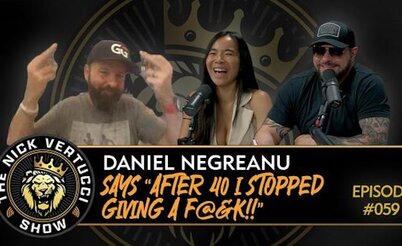In the same year, Nikolay Fal celebrated his 40th birthday and took down his first World Series of Poker bracelet event. Leading up to Bracelet Event #69, a Seven-Card Stud Hi-Lo 8 or Better event, he cashed in two other $1,500 bracelet events for around $11,500. But on June 29th, Nikolay found a way past 611 other players to the $153,730 first-place prize.
A week later, he placed tenth at the Wynn Summer Classic, collecting $45,065 from a $2,200 No-Limit Holdem event.
And after that, Nikolay also had great results in Cyprus at the PokerStars Dolce Vita Series. He won around $72,000 over six cashes, including 2nd and 4th place finishes in Holdem events.
Fresh off his solid performances in Las Vegas and Cyprus, Natasha Ego1stka had a chance to interview Nikolay. The conversation is translated from Russian, his native language.
– Hi, Nikolay! Congratulations on winning the long-awaited bracelet. How many years have you been trying to win one?
– I recently started doing the math, and it turns out that this is my seventh WSOP. I only missed the series during Covid and 2022.
– Is the bracelet an important achievement for you? You can win $200k in a nearby casino or just win a bounty.
– If the prize money is comparable, I would, of course, always take the bracelet. But I would easily exchange my victory for second place with $300-400k in prize money. I am not a pensioner yet and plan to win a couple more bracelets. Numbers are more important to me than titles, I am a family man after all. But I would not exchange $200k in prize money for my $153k+ bracelet.
After the win, I had a deep run at Wynn, where they gave $600k+ for first place. It is clear that winning such a tournament is much nicer than any bracelet, but unfortunately, I was knocked out on the final bubble and only got $45k.
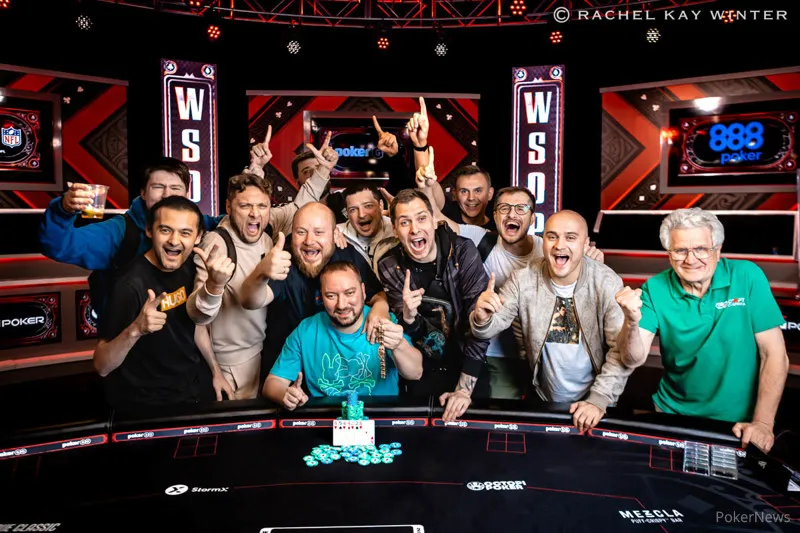
– Have you ever imagined winning a bracelet?
– I even dreamed about it a couple of times. I have a lot of dreams, but I don’t remember them all. I only remember some crazy stuff – in my dream, the WSOP was held in Dubai, and to get a bracelet, you had to win a team tournament, where you first played poker and then sailed on a boat. My partner fell off the boat and sank like a stone to the bottom, but somewhere in the depths, a dolphin caught him and pulled him to shore. I woke up before the end of the “swim”, so I don’t even know whether we won or not.
I also once dreamed of a stand with fans. In real life, it turned out very similar. Starting from 3-max, all our guys were rooting for me. Beer on the rail flowed like a river, and I felt powerful support. In general, it was fun.
– What emotions did you experience after the victory? Did your expectations match reality?
– I was extremely tired, but I was very happy. The first two days after the victory I felt like I had done something very important, and ticked a box.
I've had bigger wins, but this time, the emotions were much stronger. You understand that you have entered the history of poker. You can lose or spend the prize money, but no one can take away the title, even if you physically lose the bracelet. Although the bracelet itself is, of course, so-so. At the Kazino Sochi, they give better ones.
– If the bracelet was important to you, what else do you strive for now?
– Well, Scott Seiver won three bracelets in this series. Also, you can try to catch up with Phil Hellmuth, although it will be problematic to surpass this guy. However, now it is becoming easier and easier to do this. The number of tournaments is increasing every year. Previously, they played 30-50 tournaments per series, and I was one of the last to play tournament No. 97. It turns out that more than a hundred tournaments are held per series (editor's note – this year they held 99 bracelet tournaments ).
– Do you share the dissatisfaction of some regs that bracelets are becoming less valuable and are being given out to everyone?
– This is a natural course of events. And they are not devalued – there are more tournaments, but also more participants in them. In the first years, bracelets were generally given by voting, which is also reasonable – community recognition is worth more than beating 30-50 people.
Each bracelet is incredibly important, and only those who can't win devalue them. Like "a bracelet is some kind of crap, anyone can win it on the Internet in two days." Well, go and win! When you win and continue talking about devaluation, you will be listenable. This is all talk in favor of those who can't win.
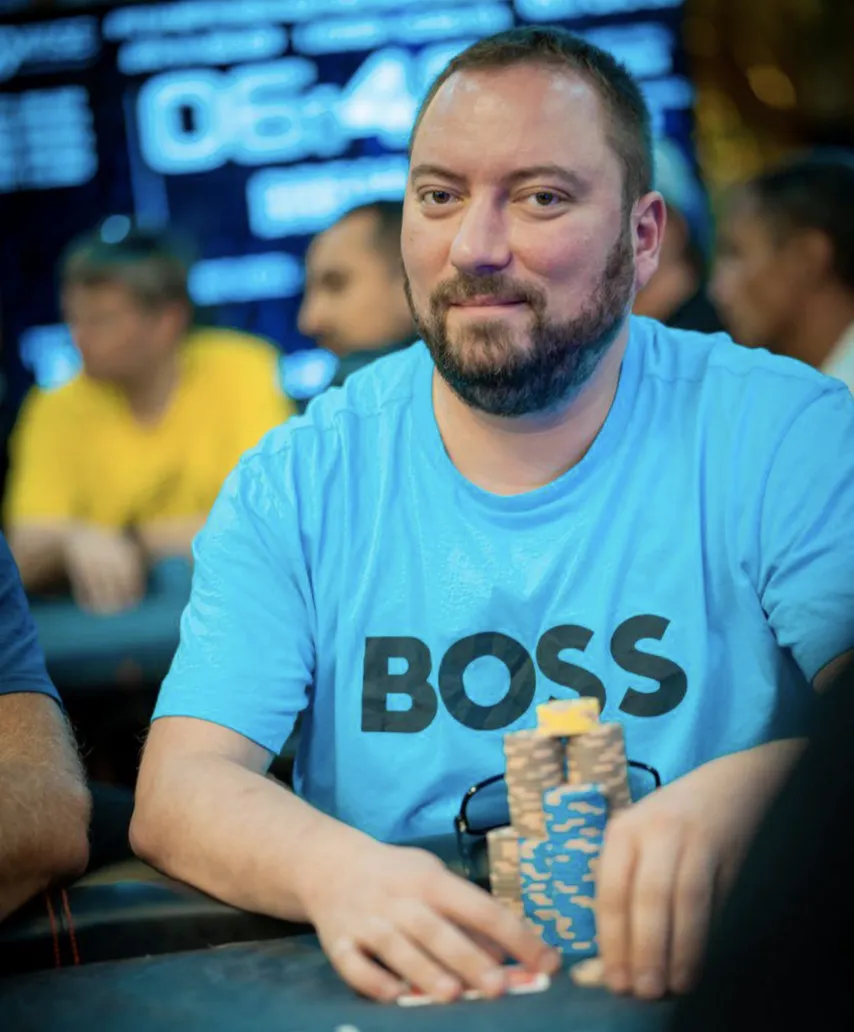
– What happens after the WSOP victory? How is everything organized? I saw that you had some story with the bracelet.
– I won the last hand and they took me to a photo shoot. They collected the chips and cards, gave me a bracelet and took pictures. Then they asked if I wanted a bracelet ceremony, with an anthem and all the other honors. Well, of course, I wanted a ceremony! They took the bracelet and gave me a form to fill out, and then Effel’s deputy contacted me and we agreed on a date for the ceremony.
I came to the awards ceremony a few days later, and they asked me: "Where's your bracelet?" What do you mean!? You should ask! I had to hold the awards ceremony with someone else's bracelet. About 10 minutes later, they finally found my bracelet. The awards ceremony was held in Paris, and the bracelet, apparently, had been lying in the Horseshoe the whole time, where we were finishing the final. Anyway, they turned on the anthem, officially presented the bracelet, and I immediately went to register for the next tournament.
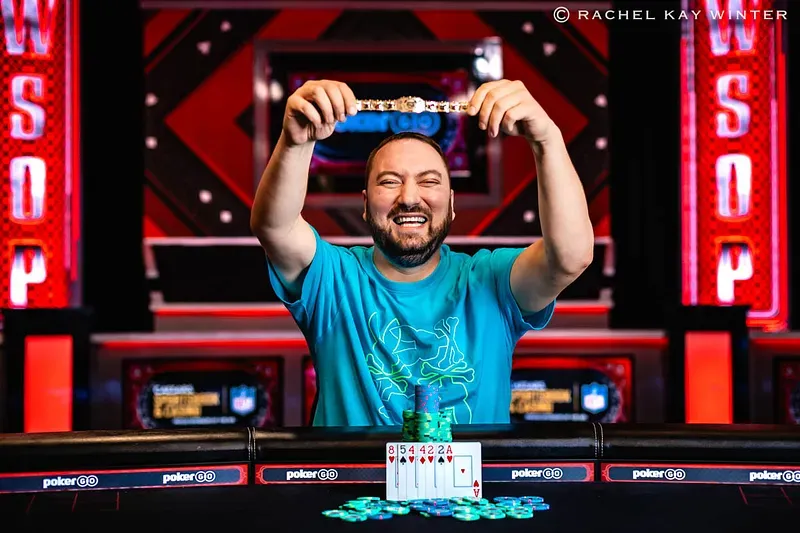
– Was the tournament you won different from the others? Did you have a premonition of a win or see any signs?
– The whole tournament was just terrible for me. I spent the first day with a stack below average, the whole second day the stack did not rise above 6 big bets, and I had to fight for every bring-in. Meanwhile, people kept dropping out. Only around the pre-final, I started to get on more or less well. At the final table, I won a big pot with a wheel and got a stack of 4 million out of 15 million in the game. At that moment I thought that I would not let this tournament go.
Yuval Bronshtein was eliminated, and another strong reg was eliminated, so only tight guys remained, except for Christian Roberts, with whom I met in heads-up play. He played the entire final very well, and I was impressed. In heads-up, he practically did not throw anything away until the fourth or fifth street, so you had to constantly come up with something, and for the card to go.
We went into heads-up with roughly equal stacks and the fight was tough. He even suggested splitting the prize money, more as a joke. I'm not against it, but we're playing for a bracelet, and Christian says that he already has a bracelet, and this one is, like, mine. None of this sounded particularly serious, but when he said it, I realized that he was ready to go for broke, and gradually, I finished him off.
– Who caused difficulties besides your opponent in heads-up?
– Rather, there were people who didn’t understand how to play stud hi-lo at all, but they all flew out by the middle of the second day. The strongest, at least in terms of regalia, was Yuval Bronshtein. On the second day, he won 17 all-ins, and it seemed that it was simply unrealistic to knock him out, but we still managed. Most of the players were just collecting solitaire combinations and waiting for the pay jumps.
– In your channel description you wrote that “any tournament can be won if you have the right music in your headphones.” What did you listen to during the final or before it?
– I didn’t even take my headphones out during this tournament. I only listen to music in Hold’em and Omaha tournaments because I’m bored. And I regularly post playlists and music selections on the channel in the “Neo’s Choice” section.
– You play a lot of limit games at the WSOP, but how do you practice outside of Vegas? Don’t you get bored without limit games?
– I miss it a lot, but I rarely practice. Outside of Vegas, I play on the NutsPoker app, and that’s really all I can do. The $30/$60 game is fairly regular there.
– Why do you think limit and mixed games are becoming less and less popular online? It seems that they are much more convenient to play there.
– I don’t think they’ve become less popular, it’s just that Stars screwed up. Some sites attract a lot of people, so if they returned to Russia, Montenegro and other countries, everything would be OK. If the pool was shared, like before, then limit games would flourish.
– Well, the number of tournaments and games in general was decreasing even before PokerStars left Russia.
– Stars decided to try to do everything legally and restricted those countries where limit was popular, plus they added reservations. Before reservations, everything was fine, but now 20 cripples are playing. And in general, everything has died out on Stars.
If you dream abstractly that there will be one pool, then everyone will again happily play limit games, but now most people just have nowhere to do it. The Americans have their own apps. The game is there and it's not bad. Personally, I decided not to bother, since I had to find an agent and make sure that I wasn't screwed, but I know that you can come to an agreement.
Now if we're bored, we play with our Russian-speaking group at NutsPoker. It's a pretty good school, as it turned out at the WSOP.
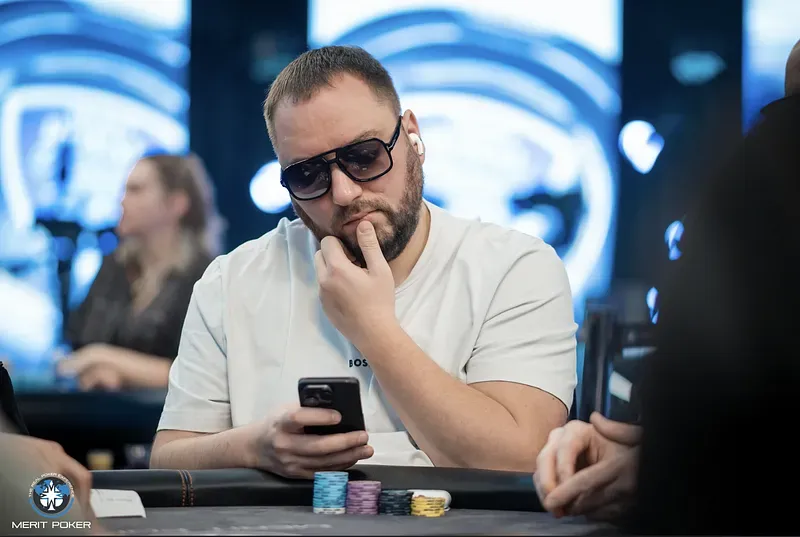
– It seems that things were going pretty badly for you at the WSOP, or did you always play cash games at the same time?
– I almost never play cash in Vegas. Sometimes I can, if I’m out early and there’s still a lot of time before the evening tournaments.
Of the seven WSOP trips, I only came out negative on one by a microscopic amount, but there really were no big wins. I always made a little bit. This year I made it to the final for the first time and immediately won a bracelet. Few can boast of that. I talked to Bronshtein about this, it took him eight finals for his first victory.
– Where do you stay during the series?
– We rented a house with Tolik Zlotnikov. During the series, many people came and went, at different times Adrenalin, Nikita Kalinin, and Lesha Donetsk lived with us, then Garik Tamasyan flew in. That's the kind of company we had.
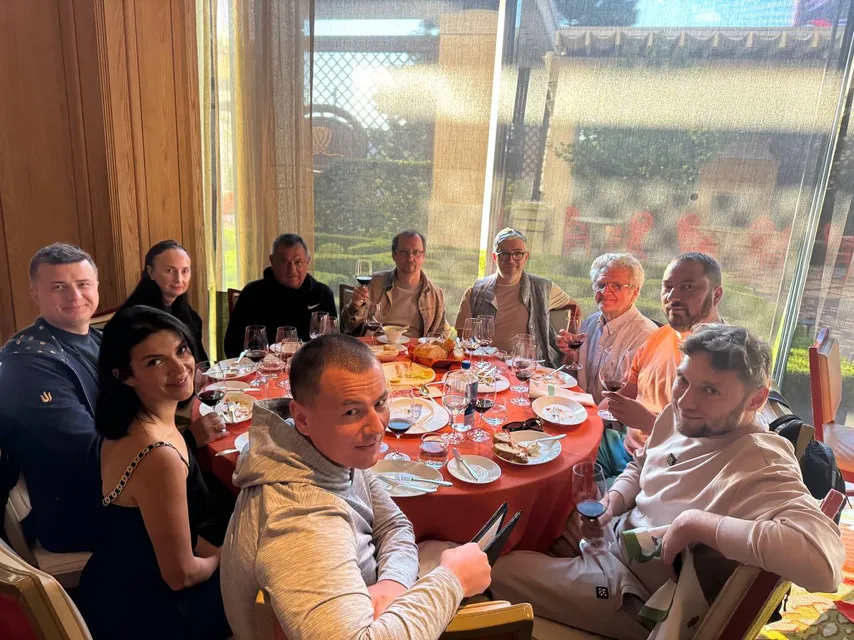
– How do you relax after tournaments?
– There is no time to relax in Vegas! At home there is a pool and a barbecue, so after tournaments, we fry meat, scallops, and shrimp, and drink a little. In general, we live in grind mode. The standard leisure time during the World Series is dinner in the city or at home and sleep, and the next day everything starts over again. We go to bed, wake up, go for a ride. Sometimes we also go to visit other poker players, but there the set of entertainment is standard – FIFA, barbecue, and wine.
This year it was so hot that we didn't want to go outside at all. We didn't even go to the lake once. Riding jet skis at +46°C is not much fun, you can get completely burnt in 20 minutes.
– Do you often have discussions about hands and complaints about bad beats at home?
– Of course, often. It seems that it's time to charge $10 for every bad beat heard.

– Where do you live now and how often do you play live there?
– I've been living in Sochi for six years now, and there's some kind of action here every month. Last year I attended 17 events. It turns out that I live at home for a week, and then attend an event for a week, sometimes with a bias towards poker.
Apart from poker, I don’t really do anything special. More precisely, I take care of my beloved family – I have a wife and two daughters, and I am very grateful to them for putting up with our long separations. I only play at the World Series, or in Sochi and Cyprus. So I take care of the kids, and I play in my free time. Since my youngest daughter was born, I have stopped playing online. I just don’t have time for 12-hour sessions.











